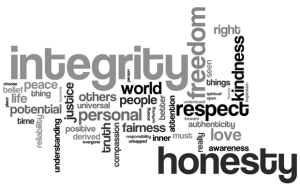If you had asked me nine to ten years ago to articulate the importance of vales and what mine were, I would not have been able to. It has been my learning journey, specifically over the past nine years that has enabled me to do so now….
How Do Your Values Equate to Your Credibility?
Over the years I have done several exercises both to determine and to measure my values. Our values are from what and where we operate. I have found that to be an effective leader I need to be clear about what my guiding principles are, which allows me to be clear about what I believe. This comes in handy when confronted with the issues, challenges and difficult conversations that I’ve often had to have. Knowing my core values allows me to set personal examples of what I expect of others. It also gives me a basis from which to manage and lead others, to follow through on commitments I have made, and to hold others accountable to shared values.
 If you had asked me five years ago to articulate what I just did above, I would not have been able to. It has been my learning journey, specifically over the past five years that has enabled me to do so now.
If you had asked me five years ago to articulate what I just did above, I would not have been able to. It has been my learning journey, specifically over the past five years that has enabled me to do so now.
I recently went through the process again of looking at my value system using a different tool. This tool, from Coaching Out of the Box: Personal Groundwork for Coaching, took me through what is called a Core-Essential Value Exploration in which you are asked a series of questions about people you admire, people in your inner circle, times you felt alive and things you loved to do as a child. Once you completed the survey you look for common themes and observations, then draw from it what you may describe as your possible core-essential values.
When I looked at the possible core-essential values provided and considered them based on the questions asked, these things jumped out at me: Truth, Discovery, Fun, Inspiring & Leadership. I then went back to some of my previous work on values discovery. Over the years these values have consistently been Family, Honesty/Integrity, Trust, Respect & Dependability. There are definitely some correlation between the two sets and as I re-visited the work I had completed in the workbook, the themes that reflected those same values came through again, loud and clear.
No matter what our values are, they drive our behaviour, which gives us among other things, credibility (Kouzes & Posner). As coaches we have the ICF code of ethics to guide us and provide credibility, but we also have our own personal ethics – values system – that provide credibility. How we “treat” and “view” our clients, employees, friends, family members will in the long run determine our success as much as anything else. Someone once observed that if you want to know the values of someone, watch how they treat a server in a restaurant or a clerk in a store.
Additionally, as coaches, knowing, recognizing and appreciating our own personal values helps us in assisting our clients to recognize and understand theirs.
Picture credit: http://www.futuresalon.org/2010/02/
John K Whitehead & Associates assists individuals and organizations in becoming more effective by improving their interpersonal communications, emotional intelligence and resiliency.
You can read my blog at https://johnkwhitehead.ca
If you have enjoyed reading these posts, please Follow Me
